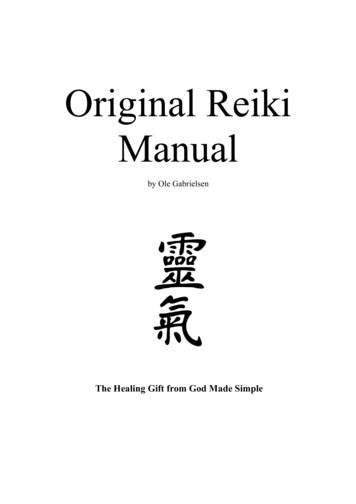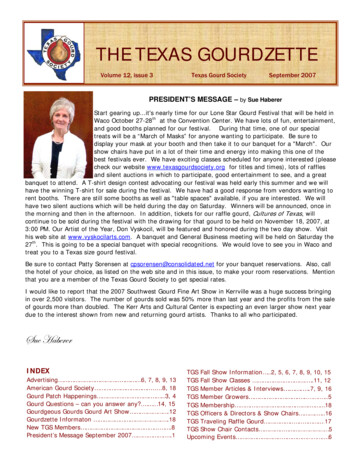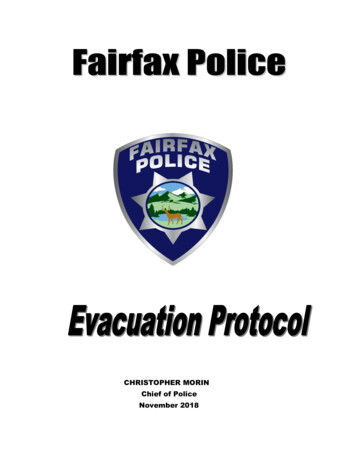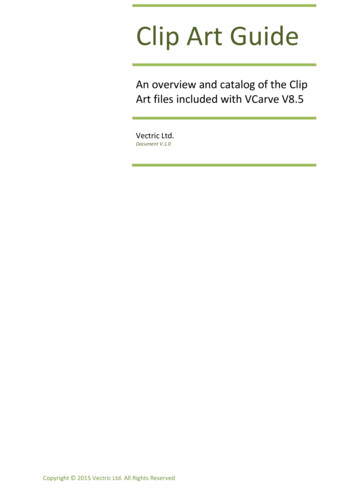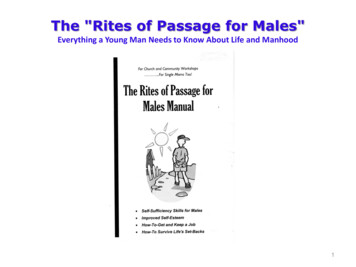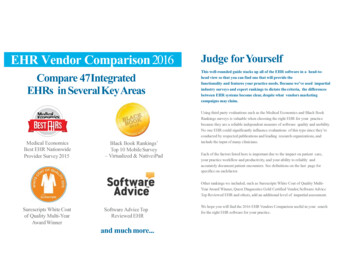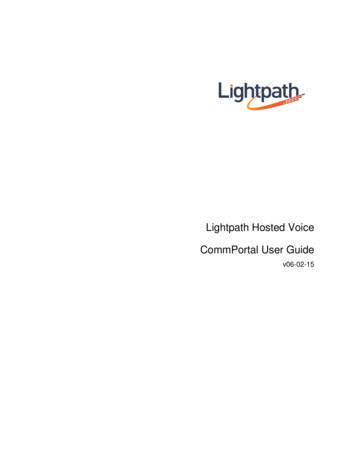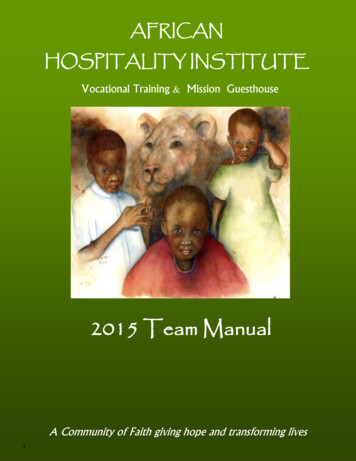
Transcription
AFRICANHOSPITALITY INSTITUTEVocational Training & Mission Guesthouse2015 Team ManualA Community of Faith giving hope and transforming lives1
AFRICANHOSPITALITY INSTITUTE2015 Team ManualSection 1:Uganda, AHI, & Etkingaala Ranch2
ABOUT UGANDAThe Human Poverty Index ranks Uganda 72nd out of 108 countries with 2 million orphaned children. 60% ofUgandan children never complete primary school. 80% of the population is under 30 years old, 50% under 15.Most sponsorship programs end at 15.Uganda has the 5th highest growth rate in the world and the 2nd highest fertility rate with millions of unplannedbirths.Unemployment rates are out of control with 80% unemployment in ages 25-24. Nine million Ugandans live onless than 1 per day.Uganda is plagued by health problems including high rates of malaria, HIV/AIDS, tuberculosis, malnutrition, infantmortality, and maternal mortality.3
AFRICAN HOSPITALITY INSTITUTEAHI is a community of faith committed to journey with those who want to step into atransformed life marked by hope, wholeness and new opportunities.A H I MIS S IO N S TA T EM EN T:AHI prepares vulnerable, unemployed young adults in Uganda to lead significant and productive lives that blessothers. We accomplish this through a two year journey with an intentional mentoring community, character development and vocational training.C O R E VAL U ES :COMMUNITY that fosters trust, collaboration, team work & health relationshipsSUSTAINBLE PLANNING for the environment and income to support AHIVOCATIONAL AND LIFE SKILLS TRAINING for young adultsCHARACTER EDUCATION in values and worldviewV O C A TIO N AL T R A IN IN G & G U ES T HO U S EAHI was created in 2002 to provide vocational training to chronically poor and vulnerable youth; preparing themfor employment in the growing tourism and hospitality industries in East Africa.Students are admitted without regard to race, gender, or religion. Tuition and salaries are sponsored by the generous donations of individuals and organizations.Visitors are warmly welcomed at AHI. Short-term mission groups and individuals stay at the AHI guesthousewhile traveling or volunteering their services to the community.Students gain hands on-training in an employable trade in the dining room, guestrooms, and landscaping the beautiful grounds at AHI. They learn teamwork and valuable job skills while they help provide comfortable lodgingexperience, quality meals, and gracious service.AHI is attracting Hoteliers and Chefs from the USA, Holland, Italy, and Kampala to help training and recruit AHIgraduates.Your generous support will help young men and women who are hardworking and highly motivated to break freefrom unemployment and poverty.M AG G I E ’S V IS I O N :Maggie was self employed in the hospitality industry for 25 years in Kirkland, Washington, USA. She first visited the Cornerstone Ranch in 2002 as a volunteer with AfricanChildren’s Mission. She moved to the bush of Nakasongola in East Uganda full time in2006 to build and manage the Guesthouse and vocation program.“My dream is to see AHI continue to grow into an intentional community where dailyexpressions of joy, hard work, and empowerment will provide a sacred space that nourished, challenges, and transforms both the guest and host; and perhaps even the largercommunity. We invite guests to participate with us.”-Maggie JosiahFounder, African Hospitality Industry4
AFRICAN HOSPITALITY INSTITUTEAHI is a community of faith committed to journey with those who want to step into atransformed life marked by hope, wholeness and new opportunities.T H E V IS I O NTourism may be one of the most viable industries in Uganda to help reduce poverty and provide opportunities forits young population. One of the greatest drawbacks to creating stable tourism is the lack of trained workers. It isestimated that in Uganda over 60% of employees in the Hospitality Industry are Kenyan, because Ugandans lack theskills to work n this vital and growing sector.Teaching an employable trade is a practical solution in helping developed nations break the cycle of poverty. Ourapproach caters to ‘hand’s on’ training in Western hospitality skills which enables our graduates to secure employment in the global world. African Hospitality Institute offers a 2 year program to rural unemployed youth, 17 to 25years old. We maintain a high staff/ trainer to student ratio for personalized training that stresses: service to others,life skills, in-depth character development, English language and literacy programs, computer training as well as usingour elegant facility as the training ground to prepare our graduates to work in 5 Star Hotels. Attention to excellencein Customer Service is emphasized so that our graduates can be employed by other retail businesses. We believe thatour students are ‘Trained, Trustworthy and Transformed’ by their experience of learning at our vocational trainingprogram. We provide our young people with creative tools to help themselves as well as their families, communitiesand country.AHI is a private Guesthouse, unexpected out in the bush of Africa that cares for Short Term Mission teams of up to20 people. Our Teams come from all over the United States and Europe – people who are looking to add significance to their lives by helping others help themselves. Many of our teams work alongside our business and surrounding ministries, as well as partner together with remote villages to raise funds and provide manual labor forneeded projects like repairing boreholes, mudding and roofing nursery schools even helping to construct a brick andcement structure for local police. AHI also hosts other Ugandan NGO’s for staff retreats and gatherings. AHI is notopen to public.AHI is attracting Hoteliers and Chefs from America, Holland, Italy and Kampala who donate their time to teachintensive trainings to our staff trainers and students. Our AHI staff trainers are young men and women that began asstudents here. Each trainer has a complimentary position in the business operation, either in the Kitchen, Diningroom, Guestrooms, landscape and garden or maintenance and construction. Many of our guests feel they could bemore effective if they could spend longer amounts of time teaching and training than offered to a short term team.We are now in process of building and furnishing mission homes for more affordable long term living.Sustainability is one of our important goals both financially and environmentally. AHI builds only when funds are inhand; we carry no debt. AHI has constructed 10 self-contained Guestrooms and a dining facility with solar electricity and solar water heaters for Short Term Mission Volunteers to reside at while they work to help the isolated villages around Ekitangaala Ranch, located deep into the bush of Central Uganda. As an active business, we are working towards creating a healthy organization that will be able to sustain the daily operational costs of our vocationalprogram through income earned at the Guesthouse, breaking free from ‘donor dependence’.AHI is solely responsible for funding all guesthouse and vocational schoolconstruction, staff housing, salaries and daily costs of operation for the vocational school and guesthouse. All USA donations are tax deductible; AHIis a registered 501[c][3] non-profit corporation. By operating the guesthouseas a functional business, AHI is committed to reaching a high degree of self-sustainability.5
AFRICAN HOSPITALITY INSTITUTEAHI is a community of faith committed to journey with those who want to step into atransformed life marked by hope, wholeness and new opportunities.AF R I CAN H O S P I T AL I TY IN S T I TU T E B U S IN ES S M O D ELThese four core values: Community, Sustainability, Vocational Training and Character Education, serve as theDNA or foundation of AHI's business model.Community:AHI recognizes that change is difficult when done alone. We all need the encouragement, support and energy ofothers to help us make changes in our lives and communities. For this reason, when students are accepted, not onlydo they have to sign a contract, but we ask their parents and families to contract with them and us to support thestudents for the two years it will take to complete the program. One way they do this is by agreeing not to seek oraccept marriage proposals while they are in school. They must also agree to support the student's studies. These aresignificant sacrifices, but the support of community results in higher trust, student commitment level and a muchhigher likelihood they will complete the course of study.At AHI we strive to create an intentional community that fosters unity, trust, collaboration, team work and healthyrelationships. Community serves as a living laboratory for personal and professional growth. It is how the staff andstudents learn, practice modeling and apply new values and skills. Community also enables them to begin to hopeand dream, grow a sense of personal responsibility and confidence, and reframe their life experience from that of a"helpless victim" to that of a "responsible leader who makes choices".Sustainable Planning:AHI desires to approach everything it does with sustainability in mind. Environmentally, AHI seeks to use l cal, sustainable materials where possible and relies on solar panels for much of its energy needs. Funding-wise, AHI hasbuilt 10 guesthouses that provide a local, sustainable source of income that helps to support AHI's programs. Theseguesthouses also give students the chance to practice and model what they are learning with real customers, makingthe training highly relevant and much more effective. Curriculum-wise, the training material has been developed sothat the courses can be taught by local instructors and can sustainably scale or be reproduced elsewhere in Africa.Vocational and Life Skills Training:AHI provides practical vocational and life skills training. It offers training in the hospitality industry, which r mainsimportant because skills such as cooking, hosting, serving and housekeeping can help students find employmentwherever they go. In addition, life skills training in English, communication skills, budgeting, team leadership, conflict resolution and customer service provide transferable skills that will serve them well throughout their life and inany industry or business they pursue.Character Education:AHI believes that our values and worldview will affect our future as much as having strong job skills. Helping students change their worldview and character is just as critical for success as having good job skills. In countries orcommunities where poverty and disease is endemic, there is often a survival mentality that results in stealing, dishonesty, learned helplessness, etc. Character education seeks to help students develop a sense of pride and professionalism, trustworthiness, personal responsibility and reliability.AHI STUDENTS: Experience unity and teamwork in a nonjudgmental and caring community Build hope for the future by learning restaurant, hotel, and professionaldomestic skills Learn life skills including the importance of hard work, self-motivation, and trustworthiness Develop practical communication and leadership skills Receive assistance in securing future employment6
EKITANGAALA RANCHLocation: 100 kilometers [70 miles] North of Kampala—Size: 1,272 Acres—The ranch is located in Central Ugandain an isolated area called ‘the bush’, The ranch is located in the area is known as the ‘Luwero Triangle’ – the killing fields resulting from Obote’s return to power after Idi Amin was removed in 1980. Generational poverty hasimpacted this area with all of the devastation of alcoholism, AIDS, and a pervasive lack of educational opportunities.It is an isolated area with limited transportation, no public utilities for running water or electricity, and unreliableand erratic communication services. The 2000-3000 villagers residing around the ranch live their lives as their ancestors did centuries ago: mud huts with grass roofs, often hauling water from nearby swamps, cooking on wood fires.Most people walk, the road conditions are terrible, malaria is rampant, AIDS continues to kill, last year 9 peoplewere killed by machete over land issues. Most of the villagers are subsistence farmers; a few are able to earn 1 to 2 a day. Yet they remain resilient and full of joy.The ranch community has grown over the years; the need for other schools located on the ranch was needed. Anelementary Primary school now has 600 students and the Secondary School that opened in 2003 has about 400young men and women. The Rotary Water Project will have a direct impact on this secondary school.7
EKITANGAALA RANCHHistory Cornerstone Development, African Children’s Mission, and AHIThere are 2 non-governmental organizations [NGO] at Ekitangaala Ranch [Ekitangaala means ‘light’]. The organizations support one another and have created a unique community founded in humility and unity. African Children’s Mission Cornerstone Development, Uganda African Hospitality Institute is a part of the Cornerstone familyC O RN E RS TO N E D EV EL O PM E N TCornerstone Development began in 1988 to help in the rebuilding and development of that nation as it was emerging from this turbulent past. The Ekitangaala ranch community was first started as a large commercial dairy farm tocreate jobs and a source of income for programs that help underprivileged children. It is also the home of Cornerstone’s first Leadership Academy [CLA]. The Academy’s aim is to mold young people coming from poor backgrounds, but with high potential, into future leaders. These are ‘Advanced Level’ [college prep], that teach youngfuture leaders from various religious backgrounds and different tribes to learn to live together as brothers and sisters.AF R I CAN CH IL D R E N ’S M IS S IO NAfrican Children’s Mission [ACM] joined the ranch in 1996 to support the many orphaned and destitute children.The intensity of poverty, considered extreme, in this area leaves many with desperately few options for survival.AIDS, disease and war have left many orphaned or struggling to provide for their families. ACM provides childsponsorship programs for over 300 children, in addition, they operate a children’s feeding program, feeding over3,000 children lunch for free at many of the village primary schools. ACM also provides a medical clinic on theranch that cares for the ranch and the outlying community of 3000 people. The nearest hospital is an hour driveaway in an area with little to no transportation. ACM operates has a program in the Hoima area as well. ACM isresponsible for building designs and the labor to install most of the plumbing and solar at the ranch. The RotaryWater Project will have a direct impact on the Medical Clinic as it relies on rain water water hauled in by truck. Itwill also benefit the ACM Staff members that live on ranch. They are hoping to also be able to increase the efficiency of water delivery for sustainable farming projects.AF R I CAN H O S P I T AL I TY IN S T I TU T EAfrican Hospitality Institute [AHI] came alongside these organizations in 2006 to support the many visitors thatcome to the ranch. Ekitangaala ranch is a tremendous destination for short term mission teams to volunteer theirwork out in the bush of Central Uganda. The elegant guesthouse has 10 self-contained rooms, using solar for lighting and water heating. The mission guesthouse is not open to public yet functions as a small hotel or resort offering excellent meals and quality service.While caring for visitors to the ranch, AHI has developed a vocational training program, teaching hospitality skillsto unemployed youth that are financially unable to continue their education. AHI offers an intense yet healing 2year program that builds a solid foundation of growth and integrity. It is the first healthy ‘home’ for many of itsstudents. It teaches character development and vocational skills including English as a second language. This vocational training prepares them to enter into the Tourist and Hospitality Industry for entry level positions as ‘trainedand trustworthy’ workers. Plans are underway to create an irrigation system for farming and raising food which willhave a secondary impact on the surrounding villages creating opportunities for men and women to come learnabout better farming techniques and irrigation.8
AFRICAN HOSPITALITY INSTITUE TIMELINE200220032005200620072008Maggie Josiah originally volunteered with African Children’s Mission. Maggie then cameevery year for 5 weeks from 2003-2005 caring for volunteer teams working in the community and developing the vocational program and guesthouse facilityFirst 2 guestrooms constructedField Director’s home constructed, using house as school, kitchen, dining roomMaggie Josiah moved full time to UgandaFirst class of 12 students / staff taken from local bush and village area2 more guestrooms built and additional staff Quarters constructedRemolded ACM Conference Center, moving AHI kitchen and dining facility intoStaff quarters for 6 families and 2 more guestrooms builtStaff began training to become teacher/trainers of all new incoming studentsFirst official class of students began in FebruaryPartnered with Rotary Club, Kirkland to install solar into all staff quartersDonation of 12 laptop computers from Nintendo for community trainingAHI incorporated as a USA 501(C)(3) under Cornerstone Development, Africa as their incountry NGO [non-governmental on of 8 students – 7 out of 8 had secured employment within 1 month ofgraduationConstruction of 4 more guestrooms began, now with 10 guestrooms totalEleven new students started FebruaryUpgrade of solar systems at Conference CenterUpgrade of all solar at guesthouse and 4 new guest rooms were addedInstallation of 2 more solar water heaters and construction of Guesthouse loungingporch with outdoor fireplace, BBQ and outdoor kitchen.Second class to graduate 10 students December 1 – all had employment beforegraduation day. building of guesthouse lodge, install of solar water pump at bore holeSix new students started in FebruaryThe Mission House (for long term visitors) broke ground in November and was completed in early January of 2013. Began sending 2nd year students out to lodges for work experience.Five new first year students started in February while the six second year studentscomplete their final year at AHI. All 5 found employment within 1 month of graduation.This is the first time AHI has ever had two overlapping classes of first year and secondyear students. Landscape of guesthouse.Class of 8 with 3 2nd years.
AFRICANHOSPITALITY INSTITUTE2015 Team Manual\Section 2:AHI Orientation10
EKITANGAALA RANCHWHAT TO EXPECTAfrican Hospitality Institute [AHI] is part of an intentional community of faith, united in spirit to Cornerstone Development-Africa, African Children’s Mission, local villages and a growing international community. We are an intentional community out in the middle of nowhere, called ‘The Bush’. Everyone here is broken and in need ofGod’s healing. We all serve, cry, laugh, hate, makes mistakes, forgive, grow, and love one another.Lower your expectations, let go of the romance, your confidence, your timetable, be a humble learner and jumpright into our messy and foolish community that is impacting the Kingdom of God out in the busy of Africa.AHI is not a resort for tourists. Do not bring fancy clothes. We recommend bringing over a small amount of usedclothing that you can leave at end of trip. You will be living in much dust or mud. Women must wear long skirtsin the villages – make sure they are roomy a ladies will need to ride a bike in them!Respect the village customs out in the bush of AfricaAHI is not open to the public. We serve only short-term mission teams that volunteer to work within our community up to 4 weeks. AHI is a d
approach caters to ‘hand’s on’ training in Western hospitality skills which enables our graduates to secure employ-ment in the global world. African Hospitality Institute offers a 2 ye
